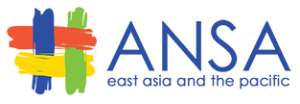
eNews | 10 November 2014 | Visit our website at www.ansa-eap.net
E-CAMP: Social Accountability for Better Education Services
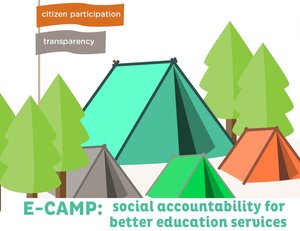 ANSA-EAP is organizing E-Camp: Social Accountability for Better Education Services which aims to amplify the importance of citizen-government engagement in the discussion, implementation and monitoring of the education MDG.
ANSA-EAP is organizing E-Camp: Social Accountability for Better Education Services which aims to amplify the importance of citizen-government engagement in the discussion, implementation and monitoring of the education MDG.
Specifically, the 3-day regional event to be held on December 3-5, 2014 at the Development Academy of the Philippines in Tagaytay City, Philippines will gather education advocates, supporters and stakeholders from civil society, government and international development partners to:
- share knowledge on citizen-led initiatives to monitor school services and opportunities for constructive engagement with government;
- harness a community of education monitors and advocates in the region; and
- draft an action agenda to strengthen citizen engagement as an approach to achieving the education development goal.
Why Philippines wins in OGP
 The Philippines has two internationally recognised programs in the Open Government Partnership (OGP) and both fall under the “Citizen Participation” commitment. These are the Citizen Participatory Audit (CPA), which won the Bright Spots prize in London last 2013, and the Grassroots Participatory Budgeting (GPB), which bagged third gold award in New York this year. I realized the Philippines’ global strength and contribution in citizen participation while preparing a presentation for an OGP regional event in Phnom Penh, Cambodia last October 16. I joined this event on the invitation of Indonesian organizers– Indonesia is taking leadership in the region-wide mobilization of East Asia and Pacific countries to join OGP since the conclusion of its OGP chairmanship.
The Philippines has two internationally recognised programs in the Open Government Partnership (OGP) and both fall under the “Citizen Participation” commitment. These are the Citizen Participatory Audit (CPA), which won the Bright Spots prize in London last 2013, and the Grassroots Participatory Budgeting (GPB), which bagged third gold award in New York this year. I realized the Philippines’ global strength and contribution in citizen participation while preparing a presentation for an OGP regional event in Phnom Penh, Cambodia last October 16. I joined this event on the invitation of Indonesian organizers– Indonesia is taking leadership in the region-wide mobilization of East Asia and Pacific countries to join OGP since the conclusion of its OGP chairmanship.
Citizen Participatory Audit e-books now online
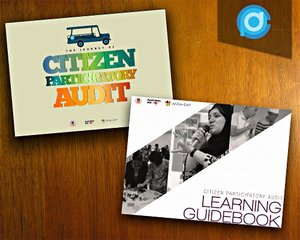 Two more publications of the Citizen Participatory Audit (CPA) Project are now available at the ANSA-EAP and i-Kwenta websites.
Two more publications of the Citizen Participatory Audit (CPA) Project are now available at the ANSA-EAP and i-Kwenta websites.
The Journey of Citizen Participatory Audit and the Learning Guidebook capture the significant change stories from CPA actors as well as its capacity building process, respectively.
The Journey of Citizen Participatory Audit comes in three major chapters, each focusing on key accomplishments during the past two years—1) Engaging citizens; 2) the Commission on Audit (COA) opening up; and 3) cultivating partnerships. The e-book also features the call for sustaining the CPA initiative and the reflections of the team members from ANSA-EAP.
The CPA Learning Guidebook on the other hand is primarily a reference material for learners and practitioners of CPA. It mainly features a road map of the capacity building process and serves as a guide to course developers and writers in crafting modules, sessions, and learning activities.
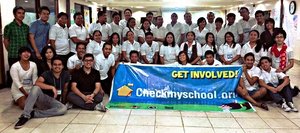 Checkmyschool (CMS) marked the start of its fourth year – Checkmyschool 4S — with its annual training for chapter coordinators held September 30 to October 2 at Cloud 9 Resort and Hotel in Antipolo City, Philippines.
Checkmyschool (CMS) marked the start of its fourth year – Checkmyschool 4S — with its annual training for chapter coordinators held September 30 to October 2 at Cloud 9 Resort and Hotel in Antipolo City, Philippines.
Thirty-three representatives from 16 cities and municipalities all over the country were trained so they could establish CMS chapters in their local areas.
The training aimed to sustain, systematize, strengthen and scale up the program’s local operations.
Mongolia’s education sector supports CMS
Checkmyschool Mongolia, jointly implemented by Democracy Education Center (DEMO) and the Affiliated Network for Social Accountability in East Asia and the Pacific (ANSA-EAP) conducted a training on the use of CRC.
In attendance were 34 school stakeholders — school principals, citizen volunteers, social workers, school managers, a representative of Metropolitan Education Department, representatives of the Independent Authority Against Corruption of Mongolia — at the Ulaanbataar Hotel training hall on October 7, 2014.
First of three geotagging workshops held
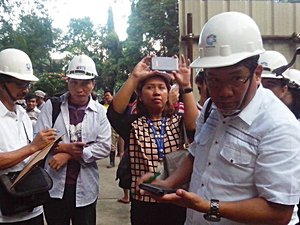 The World Bank (WB) held the first of three workshops in a series to test the guidelines on geotagging for harmonized procurement documents and the Philippine Government Electronic Procurement System (PhilGEPS) Dashboard Phase 2. The workshop was held on 22-23 October 2014 at the WB Office, Bonifacio Global City.
The World Bank (WB) held the first of three workshops in a series to test the guidelines on geotagging for harmonized procurement documents and the Philippine Government Electronic Procurement System (PhilGEPS) Dashboard Phase 2. The workshop was held on 22-23 October 2014 at the WB Office, Bonifacio Global City.
The two-day workshop was designed to perform a test-OJT using live contracts of the Guidelines in Geotagging that development partners, such as the Asian Development Bank (ADB), Japan International Cooperation Agency (JICA), and WB, use in foreign-funded projects.
Through pictures and their encrypted data or metadata, geotagging is used to “virtually” monitor and evaluate progress of projects. Essential requirements would only include GPS-enabled android phones or tablets, access to free web-based applications, and basic training. Geotagged objects are processed and uploaded to be easily and accurately located on Google Earth.
ANSA-EAP Conducts 5-day Learning Activity for i-Pantawid CSO Partners
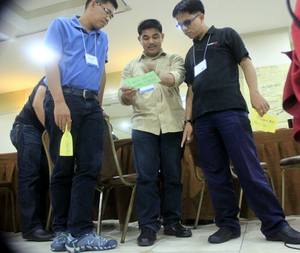 ANSA-EAP conducted an intensive capability building workshop for civil society organization (CSO) partners of the i-Pantawid Project on September 22-26, 2014 in Hotel Veniz, Baguio City.
ANSA-EAP conducted an intensive capability building workshop for civil society organization (CSO) partners of the i-Pantawid Project on September 22-26, 2014 in Hotel Veniz, Baguio City.
The workshop focused on Third Party Monitoring procedures and tools to help build partner CSOs’ capability to monitor and verify Pantawid Pamilya’s (a) beneficiaries’ listing, (b) compliance to conditionalities, (c) release of cash grants, and (d) monitoring & grievance system. The CSOs likewise will be trained to build the capability of Pantawid beneficiaries, through the Family Development Sessions (FDS), to monitor and provide feedback mainly on the quality of (a) education services, (b) health services, and (c) Pantawid’s services and systems.
eNews is published by the ANSA-EAP Operations Team, Ateneo School of Government, Pacifico Ortiz Hall, Fr. Arrupe Road, Ateneo de Manila University, Loyola Heights, Quezon City 1108, Philippines. To unsubscribe please send an email with subject “unsubscribe” to info@ansa-eap.net
